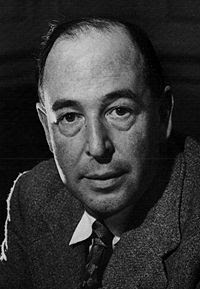
Invariably they'd put me on to C.S. Lewis. I guess they thought that if one old smart guy was able to convince himself to believe in fairy tales, then I should too. I'm sure it was meant as flattery.
Sadly, they'd then try to convince me that all of modern science was a conspiracy against Jebus, and we'd quickly fall out. Such is the way of things.
This was all brought back to mind when Gmail threw a Lewis quote at me quite by accident yesterday:-
"We are what we believe we are."I don't think that's quite true. But it's interesting to think about what Christianity says we are...
It says we're all flawed. That I've no problem with. But for many Christians, it says we're all bad. Fallen. In need of saving. Intrinsically, well, evil.
 But if Christianity does say that, then what does that say about its God, who made us in his image?
But if Christianity does say that, then what does that say about its God, who made us in his image?If you take the Bible as gospel, God-given truth, then there's no doubting that its deity does appear to have some very human, very fallible properties. All evil is his doing, just as much as all good. He's jealous. He's moody. He plays favorites. He's open to flattery. He's insecure. And, golly gosh, he changes his mind.
If God does exist, and He really is an all-encompassing, universe expanding being, then does it really make sense for him to be like that? I don't think so. Who was it who said that all theology is basically an attempt to explain away the problem of evil. Now that is a smart man I'd want to be like.
Anyway.
My parents grew up as Christians, and they definitely grew up believing that people are intrinsically fallen (even if, as I think with most believers, they didn't actually think people were bad).
I grew up in a different environment... It was idealistic. People, I believed, were intrinsically good.
I was wrong. I confused the capacity for good with goodness in nature, just as I think much of Christianity confuses the capacity for "badness" with "badness" in nature.
What I've come to realize is that people just are.
It's what they do which defines them, not what they believe.
It's interesting, I think, that much of Christian theology is based around arguing specifically that this is not the case... That all that matters is what we believe - not what we do.
Hey ho.
And with that, here's another accidental discovery, Nice work, Dale - but I don't agree...




2 comments:
You'd love Good Omeans.
Hey! I've not read much Pratchett, but clearly I'll need to check it out... Thanks for the recommendation :)
Post a Comment